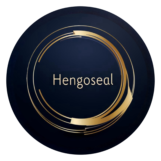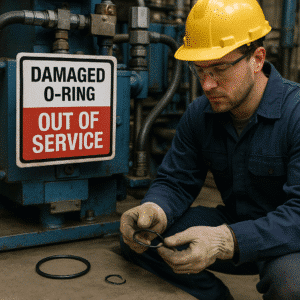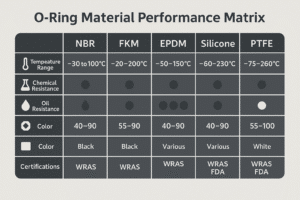Selecting the right O-ring material is a critical decision for B2B buyers. The wrong choice can lead to costly downtime, rejected shipments, or customer dissatisfaction. This guide is designed to help procurement professionals quickly identify the best O-ring material for their applications, while also ensuring compliance with industry standards and export requirements.
For more technical insights, visit our O-Ring Solutions Knowledge Hub.
To browse our complete product range, check the Full O-Ring Collection.
What Are the Key Performance Differences Between NBR, FKM, EPDM, Silicone, and PTFE O-Rings?
| Material | Temp Range (°C) | Chemical Resistance | Oil/Fuel Resistance | Hardness (Shore A) | Typical Colors | Certifications | Procurement Advice |
|---|---|---|---|---|---|---|---|
| NBR (Buna-N) | -40 to +100 (up to +120) | Good (petroleum-based) | Excellent | 40–90 | Black, brown | ASTM D2000, ISO 3601 | Best for hydraulic & fuel systems |
| FKM (Viton®) | -20 to +205 (up to +230) | Excellent | Excellent | 60–90 | Black, green | ASTM D1418, FDA optional | Best for chemical pumps & engines |
| EPDM | -50 to +150 | Excellent (water/steam) | Poor | 40–90 | Black, white | NSF, WRAS, FDA | Best for water treatment & outdoor sealing |
| Silicone | -60 to +200 | Good | Poor | 30–80 | Red, translucent | FDA, USP Class VI | Best for food, beverage & medical devices |
| PTFE | -200 to +260 | Excellent | Excellent | Rigid | White | FDA, 3A, USP VI | Best for aggressive chemicals & high purity |
Procurement Tip: Always verify that the chosen material meets both the performance requirements of your application and the certifications needed for your export market.
Which O-Ring Materials Work Best for Your Industry and Export Market?
- Automotive & Hydraulic Systems: NBR or FKM for oil and fuel resistance.
- Food & Beverage Processing: FDA-approved Silicone or EPDM.
- Chemical Processing: PTFE or FKM for aggressive media.
- Medical Devices: Silicone (USP Class VI) or FKM for sterilization resistance.
- Outdoor/Water Systems: EPDM for superior weather and steam resistance.
For maintenance and diverse inventory needs:
- O-Ring Assortment Kit – ideal for workshops and service teams.
- Custom O-Ring Maker Kit – build seals in any size on demand.
How Do O-Ring Materials Compare in Cost and Service Life for Bulk Orders?
| Material | Relative Cost | Average Lifespan* |
|---|---|---|
| NBR | $ | 6–18 months |
| EPDM | $$ | 1–3 years |
| Silicone | $$$ | 1–3 years |
| FKM | $$$ | 2–5 years |
| PTFE | $$$$ | 3–8 years |
*Assumes correct installation and maintenance.
Case Study:
Switching from NBR to FKM in a chemical pump project extended seal life by 2.5 years, reducing replacement frequency and downtime by over 60%.
What OEM Standards and Certifications Should Buyers Confirm Before Ordering O-Rings?
- ISO 3601 – Size and tolerance standards.
- ASTM D2000 / D1418 – Material specifications.
- FDA / NSF / WRAS – Food, beverage, and potable water approvals.
- MIL-SPEC / SAE – Defense and automotive specifications.
Tip: Ask for the latest test reports and certificates before placing a bulk order.
What Are the Most Common O-Ring Procurement Mistakes and How Can Industrial Buyers Avoid Them?
- Choosing based on price alone – leads to premature failure.
- Ignoring temperature extremes – causes hardening or softening.
- Overlooking chemical compatibility – results in swelling or cracking.
- Not testing samples – small trial runs prevent large-scale failure.
How Do Specific O-Ring Materials Compare Head-to-Head for Industrial and Automotive Applications?
Choosing the right O-Ring material can directly affect sealing performance, downtime costs, and compliance with industry standards. Below, we compare the most common materials side-by-side to help procurement teams make faster, more confident decisions.
NBR vs FKM – Which Is More Cost-Effective for Oil Resistance and High Temperature Sealing in Automotive and Hydraulic Systems?
| Feature | NBR O-Ring | FKM O-Ring (Viton®) |
|---|---|---|
| Temp Range (°C) | -40 to +100 (up to +120) | -20 to +205 (up to +230) |
| Oil/Fuel Resistance | Excellent | Excellent |
| Chemical Resistance | Good (limited solvents) | Excellent (wide range) |
| Cost | Low | High |
| Typical Applications | Hydraulic seals, fuel systems | Aerospace, chemical processing, engines |
Pros:
- NBR: Low cost, excellent oil resistance
- FKM: Superior chemical & high-temp resistance
Cons:
- NBR: Poor weather/ozone resistance
- FKM: Higher cost
Products: NBR O-Rings | FKM O-Rings
FKM vs Silicone – Which Performs Better for Chemical Resistance and Food-Grade Sealing in Medical and Food Processing Equipment?
| Feature | FKM O-Ring | Silicone O-Ring |
|---|---|---|
| Temp Range (°C) | -20 to +205 (up to +230) | -60 to +200 |
| Low Temp Flexibility | Moderate | Excellent |
| Chemical Resistance | Excellent | Good |
| FDA Compliance | Optional | Yes |
| Cost | High | High |
Pros:
- FKM: Resistant to fuels, solvents, and aggressive chemicals
- Silicone: Excellent flexibility in freezing conditions, FDA-approved
Cons:
- FKM: Higher price
- Silicone: Limited chemical resistance
Products: FKM O-Rings | Silicone O-Rings
EPDM vs FKM – Which Offers Better Durability in Steam, Chemicals, and Outdoor Industrial Use?
| Feature | EPDM O-Ring | FKM O-Ring (Viton®) |
|---|---|---|
| Temp Range (°C) | -50 to +150 | -20 to +205 (up to +230) |
| Weather Resistance | Excellent | Good |
| Steam Resistance | Excellent | Good |
| Chemical Resistance | Good (water/steam) | Excellent |
| Oil Resistance | Poor | Excellent |
Products: EPDM O-Rings | FKM O-Rings
EPDM vs Silicone – Which Is Better for Hot Water and Food-Grade Applications in Beverage and Sanitary Systems?
| Feature | EPDM O-Ring | Silicone O-Ring |
|---|---|---|
| Temp Range (°C) | -50 to +150 | -60 to +200 |
| Hot Water Resistance | Excellent | Good |
| FDA Compliance | Optional | Yes |
| Flexibility at Low T | Good | Excellent |
Products: EPDM O-Rings | Silicone O-Rings
NBR vs EPDM – Which Balances Cost and Oil Resistance for General Industrial Buyers?
| Feature | NBR O-Ring | EPDM O-Ring |
|---|---|---|
| Cost | Low | Medium |
| Oil Resistance | Excellent | Poor |
| Weather Resistance | Poor | Excellent |
Products: NBR O-Rings | EPDM O-Rings
NBR vs Silicone – Which Has Better Flexibility and Temperature Range for Cold Chain and Low-Temperature Equipment?
| Feature | NBR O-Ring | Silicone O-Ring |
|---|---|---|
| Temp Range (°C) | -40 to +100 | -60 to +200 |
| Flexibility at Low T | Moderate | Excellent |
| Oil Resistance | Excellent | Poor |
Products: NBR O-Rings | Silicone O-Rings
PTFE vs FKM – Which Should You Choose for Extreme Temperature and Aggressive Chemical Processing?
| Feature | PTFE O-Ring | FKM O-Ring (Viton®) |
|---|---|---|
| Temp Range (°C) | -200 to +260 | -20 to +205 (up to +230) |
| Chemical Resistance | Excellent | Excellent |
| Flexibility | Low | High |
Products: FKM O-Rings
Which O-Ring Material Is Best for High-Temperature Applications?
High Temp Aging Test Data:
- FKM retained 85% elasticity after 1,000 hours at 200°C
- Silicone retained 78% elasticity after 800 hours at 200°C
Top Choices: FKM O-Rings and Silicone O-Rings
Which O-Ring Material Offers the Best Chemical Resistance for Harsh Environments?
Chemical Immersion Test Data:
- PTFE showed <0.5% swell after 7 days in 98% sulfuric acid
- FKM swelled by 3.2% under same conditions
Top Choices: PTFE and FKM O-Rings
Can One O-Ring Material Work for All Applications? Why Not?
No. Material choice must match temperature, media, and mechanical requirements.
For flexible inventory: O-Ring Assortment Kit
How Can You Quickly Decide the Right O-Ring Material for Your Next Order?
Match the material to your application, budget, and market requirements:
- Oil/fuel → NBR, FKM
- Water/steam → EPDM
- Food/medical → Silicone
- Chemicals/extreme temp → PTFE, FKM
Want detailed performance data and application examples for each material? Visit our Industrial O-Ring Materials Guide 2025 to make informed decisions and extend seal life.
How Can You Get a Custom Quote and Fast Delivery from Hengoseal?
With 10+ years of export experience, we offer:
- No MOQ for stock items
- Standard & custom sizes
- Fast global delivery
- OEM/ODM capabilities
Urgent orders? We ship most stock sizes within 72 hours worldwide.
Request Your Quote Now | WhatsApp: +86 17622979498
What Related Resources Can Help Buyers Make a Confident O-Ring Selection?


